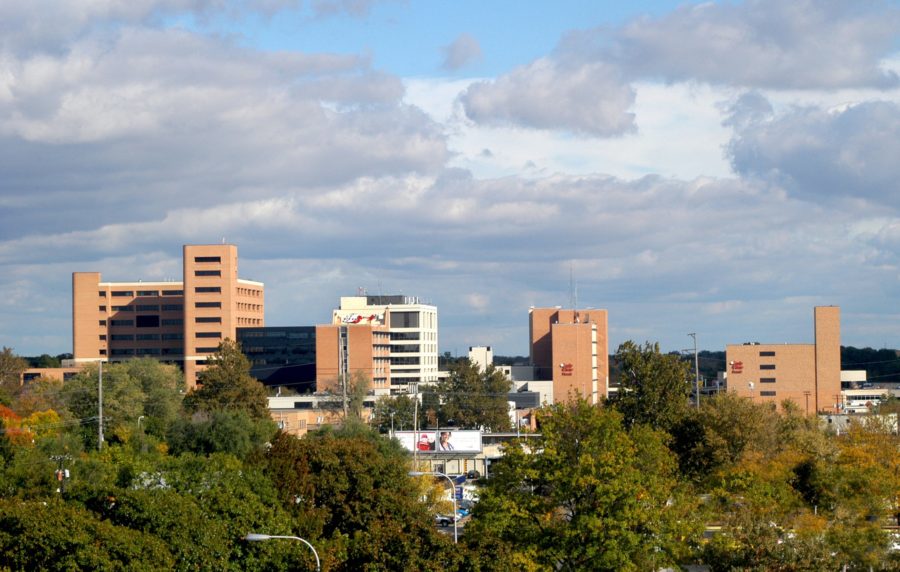Engineering-based medical school to lead cancer research
The Carle Illinois College of Medicine aims to teach students to problem-solve and to make strides in cancer research.
Mar 12, 2018
With over 1,000 applications, the Carle Illinois College of Medicine has accepted 32 with full scholarships.
Martin Burke, professor in LAS, said it will be the world’s first engineering-based medical school, with the idea to ultimately think about the fuller design of human health.
“There’s also a lot of really basic unanswered questions that, if answered, could open up opportunities for a fuller designing of tomorrow’s medicine,” Burke said.
Burke added they are very excited to build on what is already an area of strength at the University, which is cancer research.
“Illinois has world-leading expertise in cancer, across many different areas, including prevention, diagnosis and ultimately the treatment,” Burke said.
Get The Daily Illini in your inbox!
The point of the new medical school, Burke said, is to empower and enable remarkable students to find a problem and to make an impact, and the school is planning on achieving this with two innovations.
The school will have a medical-maker laboratory where students can use physical facilities to transform ideas into prototypes, Burke said. Additionally, there will be a global emergence program, where students will visit communities around the world to learn about unmet medical needs and to inspire ideas on how they can adjust them.
Burke said the curriculum is unlike typical medical schools in that every course is taught through problem-based learning, and it includes both engineers and scientists as teachers.
“All students have to come up with a capstone project where they must define an important problem, propose a thesis project and ultimately complete that capstone project,” Burke said.
Brian Cunningham, professor in Engineering, said students have to complete coursework that has been designed to include engineering concepts, so students will learn aspects of engineering that will still meet all the accreditation requirements that every doctor has to obtain.
“In the coursework, a lot of things are taught through case studies,” Cunningham said. “Introducing some engineering concepts that might be used in medical treatment or using information in ways that engineers might use them to diagnose a person and to choose the best treatment from a range of options.”
Rohit Bhargava, professor in Engineering, said the University’s existing cancer research program is currently making strides in cancer innovation.
“The cancer research center on campus is new and we have about 75 members, which means people who are funded by the government to do cancer research,” Bhargava said.
Bhargava said students perform research in several areas, from basic biology to policy to imaging and diagnostics research. He added the cancer research opportunities are student-dependent, where they can pick what they want to study.
“It’s not necessarily traditional cancer biology like we might think of it, but it’s also a mix of technology, engineering and social science,” he said.
Burke said the medical school’s cancer research goals are to help enable prevention through rational and thoughtful decision-making, to detect cancer earlier and to have a precision medical approach to cancer.
“The hope, ultimately, will be to really make advances in understanding what causes cancer and other ways to intervene to hopefully not get cancer in the first place,” Burke said.
Cunningham said the engineering aspect of study should help enable students to find what gene is driving a malignant tumor, what chemotherapy treatment is best to use and to identify drug resistance onset before the tumor continues to grow.
“(The) basic idea is that engineering tools are used to do biomedical imaging and diagnostic tests that detect the presence of things in the blood that can be used to diagnose a person with cancer or to identify which mutation they have,” Cunningham said.
Burke said another goal is to achieve a democratization of health care, where people are empowered and enabled to participate in understanding their illnesses, diagnosing what is wrong with them and being engaged in figuring out what to do to fix it.
Burke said there is really a transformative opportunity in taking a step back and thinking differently about what human health can look like in the future.
“We’re excited to impact not only Illinois or the United States, but the world, and thinking about what tomorrow’s healthcare can look like,” Burke said.






